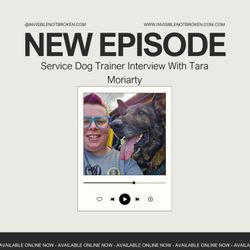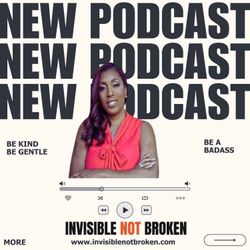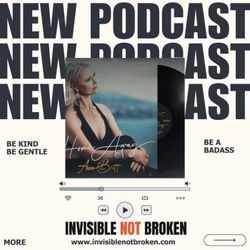Share

Invisible Not Broken - Chronic Illness Podcast Network
Author of “The Girlfriend’s Guide to Lupus”: Amanda Chay
•
Monica Michelle is joined by author Amanda Chay.
Amanda lives with Sjögren’s and Lupus.
In this episode, Monica and Amanda discuss:
- Amanda’s book & diagnosis
- Outlooking on work & writing
- Navigating chronic illness with kids & family
00:26 - Intro + The Girlfriend’s Guide to Lupus
02:17 - Amanda’s diagnosis
10:09 - Amanda’s outlook on writing
17:11 - Navigating chronic illness with kids & family
23:29 - Labels and roles
26:24 - Flare reads & closing remarks
The full transcript and all links mentioned can be found on the episode page on invisiblenotbroken.com
More episodes
View all episodes

Interview With Service Dog Trainer: Tara Moriarty
45:00|SummaryIn this conversation, Tara Moriarty discusses her journey into the world of service dogs, the challenges of finding and training them, and the importance of understanding their role in supporting individuals with disabilities. The discussion covers the costs associated with obtaining a service dog, the various training methods, and the misconceptions that the public holds about service dogs and their handlers. This conversation delves into the distinctions between service dogs and emotional support animals, emphasizing the legal definitions and roles of each. It explores the challenges faced by service dog owners, including the need for proper training and support systems. The discussion highlights the importance of planning for the future care of service dogs, especially for individuals with degenerative conditions. Additionally, it covers the process of finding the right dog and trainer, advocating for positive reinforcement training methods, and the significance of using food as a motivational tool in dog training.Chapters00:00 Introduction to Service Dogs and Their Importance03:13 The Cost and Accessibility of Service Dogs06:07 The Journey into Dog Training08:52 Understanding Dog Behavior and Training Methods12:06 The Need for Service Dogs: When is it Time?14:59 Choosing the Right Breed for Service Dogs17:45 Public Misconceptions About Service Dogs25:50 Understanding Service Dogs vs. Emotional Support Animals29:08 Navigating the Challenges of Service Dog Ownership31:55 Preparing for a Service Dog: Key Considerations34:22 Finding the Right Dog and Trainer38:53 The Importance of Positive Reinforcement in Training44:57 Innovative Training Techniques and ResourcesTakeawaysService dogs can be very expensive, ranging from $20,000 to $40,000.Nonprofits may offer lower-cost options, but availability is limited.Training a service dog can be a complex and costly process.Understanding dog behavior is crucial for effective training.Positive reinforcement is a more effective training method than punishment.Many people consider getting a service dog too late in their journey.The right breed for a service dog is less important than temperament.Labradors, Goldens, and Poodles are commonly recommended breeds.Public misconceptions about service dogs can lead to challenges for handlers.Emotional support is not a task that qualifies a dog as a service dog. Service dogs are task-trained to mitigate specific disabilities.Emotional support animals provide comfort but lack legal recognition as service animals.It's crucial to have a plan for the care of a service dog as health conditions change.Choosing the right breed is essential for first-time service dog owners.Positive reinforcement is key to effective dog training.Finding a qualified dog trainer can significantly impact training success.Service dog tasks are tailored to individual needs and circumstances.Proper training and socialization are vital for service dogs to function in public.Planning ahead for a service dog's future is necessary for responsible ownership.Using food as a reward can enhance training and strengthen the bond with your dog.Keywordsservice dogs, dog training, psychiatric service dogs, emotional support, dog behavior, training methods, cost of service dogs, choosing a service dog, public misconceptions, service dogs, emotional support animals, training, positive reinforcement, disability, dog ownership, service dog tasks, finding a trainer, dog breeds, service dog laws
Tisha Foster: Glamour, Motherhood, Faith, and Chronic Illness
53:13|SummaryIn this conversation, Tisha shares her journey of living with chronic illness, emphasizing the importance of gratitude, community support, and the struggles of public perception. She discusses her experiences with autoimmune disorders, the challenges of diagnosis, and how she has reframed her relationship with her illness, focusing on empowerment rather than battle. In this conversation, the speaker shares their experiences of parenting with a disability, discussing the challenges of communicating their condition to their children and the emotional toll it takes on family dynamics. They explore the journey of finding purpose while being bedbound and the therapeutic process of writing a book about their experiences. The discussion emphasizes the importance of support systems, the need for understanding in educational settings, and the resilience required to navigate life with a disability.TakeawaysGratitude can be a powerful tool for coping with chronic illness.Public perception often overlooks the struggles of those with invisible illnesses.Community support plays a crucial role in mental health and resilience.The journey to diagnosis can be long and fraught with challenges.Reframing the narrative around illness can lead to empowerment.It's important to check in on loved ones, even those who seem happy.Sharing personal stories can help others feel less alone.Wearing heels can be a form of self-expression and empowerment.Language matters when discussing illness and identity.Writing can be a therapeutic way to share one's journey. Talking to children about disabilities requires different approaches based on their age.The emotional impact of a parent's illness can lead to complex family dynamics.Creating a game out of challenges can help children cope with difficult situations.Parents often feel guilt for not being able to participate in typical activities with their children.Support from family and friends is crucial when dealing with chronic illness.Living with a disability can lead to feelings of isolation and despair.Finding purpose and joy in life, even from bed, is possible.Writing about personal experiences can be a healing process.It's important to advocate for accessibility in schools and public spaces.Resilience and community support are key to thriving despite adversity.Keywordsgratitude, chronic illness, public perception, diagnosis journey, living with illness, mental health, autoimmune disorders, personal stories, resilience, community support, disability, parenting, mental health, communication, writing, resilience, family dynamics, bedbound life, emotional support, personal journey
Musician Ann-Britt Celebrating New Music, Creativity and Chronic Illness, and Creating New Goals
53:21|SummaryIn this conversation, Monica Michelle and Ann-Britt discuss their shared experiences with chronic illness, particularly Ehlers-Danlos syndrome. They explore the challenges of living with a chronic condition, the importance of community support, and the therapeutic role of music in coping with illness. Ann-Britt shares her journey from being an active musician to adapting her life around her health challenges, including the use of a wheelchair. They also touch on the differences in healthcare systems between Denmark and the USA, emphasizing the need for better understanding and support for those with chronic illnesses. In this conversation, Monica Michelle and Ann-Britt discuss the challenges of traveling with a disability, the emotional journey of adapting to life changes due to chronic illness, and the importance of setting boundaries. They explore generational differences in self-care, the concept of diminished normalcy, and the emotional ties to home. Ann-Britt shares her musical inspirations and the themes of her upcoming album, highlighting the beauty in small moments and the power of creativity in the face of adversity.Keywordschronic illness, Ehlers-Danlos syndrome, mental health, creativity, music therapy, wheelchair use, healthcare systems, Denmark, USA, community support, chronic illness, accessibility, self-care, personal growth, music, life changes, boundaries, emotional health, travel experiences, generational differences
Author of “Finding A New Normal: Living Your Best Life with Chronic Illness”: Suzan Jackson
49:39|Monica Michelle is joined by author Sue Jackson.Sue lives with Myalgic encephalomyelitis/chronic fatigue syndrome (ME/CFS) and Lyme disease.In this episode, Monica and Sue discuss: Sue’s pathway to diagnosis Parenting with chronic illness and parenting a child with chronic illnessManaging ME/CFS from diagnosis to creating routinesUsing books to cope emotionallyWriting a book while having chronic fatigueTIMESTAMPS00:46 Sue’s diagnosis and how she manages her symptoms 13:03 Parenting with a chronic illness25:02 COVID-19’s impact on chronic illness 30:35 Books as a form of escapism and connection42:00 The challenges of writing and the importance of routines with chronic illness The full transcript and all links mentioned can be found on the episode page on invisiblenotbroken.com
Using Self-Portraits to Represent Chronic Pain
01:00:29|Monica Michelle is joined by artist Kyrianna Bolles.Kyrianna lives with chronic pain.In this episode, Monica and Kyrianna discuss: Kyrianna’s struggle to be accommodated for her pain throughout school yearsHow Kyrianna uses her portraits to help represent other’s chronic conditionsThe communities Kyrianna has built, from a college support group to an artist collectiveKyrianna’s favorite tools for art and chronic painTIMESTAMPS00:00 Intro to Kyrianna 10:45 Kyrianna’s self portraits 24:42 Kyrianna’s Support group 33:40 Animus45:57 Kyriannas favorite support tools The full transcript and all links mentioned can be found on the episode page on invisiblenotbroken.com
Dory’s Corner: New Podcast intro with Host Nick Clemmons
01:00:25|Monica Michelle is interviewed by consultant and content creator Nick Clemmons. Nick recently started the blog Dory’s Corner with Invisible Not Broken. A companion podcast hosted by Nick will be released soon.Nick lives with Sickle Cell Disease. Monica lives with Ehlers-Danlos Syndrome, POTS, MCAS, and Fibromyalgia.In this episode, Nick and Monica discuss:Monica’s diagnostic history and her relationship with her disabilitiesHow Monica learned to advocate for herselfLack of media representation influencing abled people’s perspectives of disabled folksHow Monica’s family functions around disabilityTIMESTAMPS00:42 - Monica’s history and relationship with her disabilities13:06 - How Monica found her voice *Trigger Warning: Mention of SA* 31:40 - Media representation45:09 - Monica’s familyThe full transcript and all links mentioned can be found on the episode page on invisiblenotbroken.com
Disability Access in the Education System and How to Support Disabled Folks’ Needs with Nick Clemmons
54:05|Monica Michelle is joined by consultant and podcast host Nick Clemmons.Nick lives with Sickle Cell Disease.In this episode, Monica and Nick discuss:The ways disabled folks are often forgotten in education infrastructureHow Nick navigates societal limitations to achieve his goalsDisability representation in the mediaKnowing how to realistically offer help to disabled folksTIMESTAMPS00:42 - ADA, Title IX, and disability access in schools20:08 - How Nick makes and achieves opportunities 28:40 - Media and disability40:42 - How to respectfully be concerned about someone else’s needsThe full transcript and all links mentioned can be found on the episode page on invisiblenotbroken.com
Vulnerability, Resiliency, and Advocacy with Tim Reitsma
47:06|Monica Michelle is joined by consultant and podcast host Tim Reitma.Tim lives with Crohn's Disease.In this episode, Monica and Tim discuss: Tim’s resiliency through managing his Crohn’sThe importance of self-advocacy, especially in the workplace Tim’s podcast why he shares stories of those with invisible illness TIMESTAMPS00:47 - Tim's diagnosis 06:31 - How and why Tim applies self advocacy15:41 - Why Tim started his podcast22:42 - Invisible condition etiquette31:00 - What HR can do better for employees with invisible illness39:31 - Tools Tim uses to care for his Crohn’s outside the homeThe full transcript and all links mentioned can be found on the episode page on invisiblenotbroken.com
Tech and Disability: What VR Offers the Disabled Community with Sunny Ammerman
01:10:27|Monica Michelle is joined by artist and disability advocate Sunny AmmermanSunny lives with Septo-optic dysplasia, panhypopituitarism, Optic Nerve Hypoplasia, and is missing a membrane in the brain called the "septum pellucidum".In this episode, Monica and Sunny discuss: Sunny’s complex disorders and how she copes with themEverything VR provides from accessible gaming, social platforms and the potential for better online education.Various VR/AR games and their gameplay Sunny’s VR support groupTIMESTAMPS00:45 - What VR/AR offers for chronically ill and disabled folks11:57 - Sunny’s conditions and how she copes with them17:55 - Features that make VR games accessible or inaccessible as well as different games and their play experiences37:13 - The social aspects of virtual gaming51:32 - What opportunities VR has for the future1:04:49 - Sunny’s VR support group The full transcript and all links mentioned can be found on the episode page on invisiblenotbroken.com